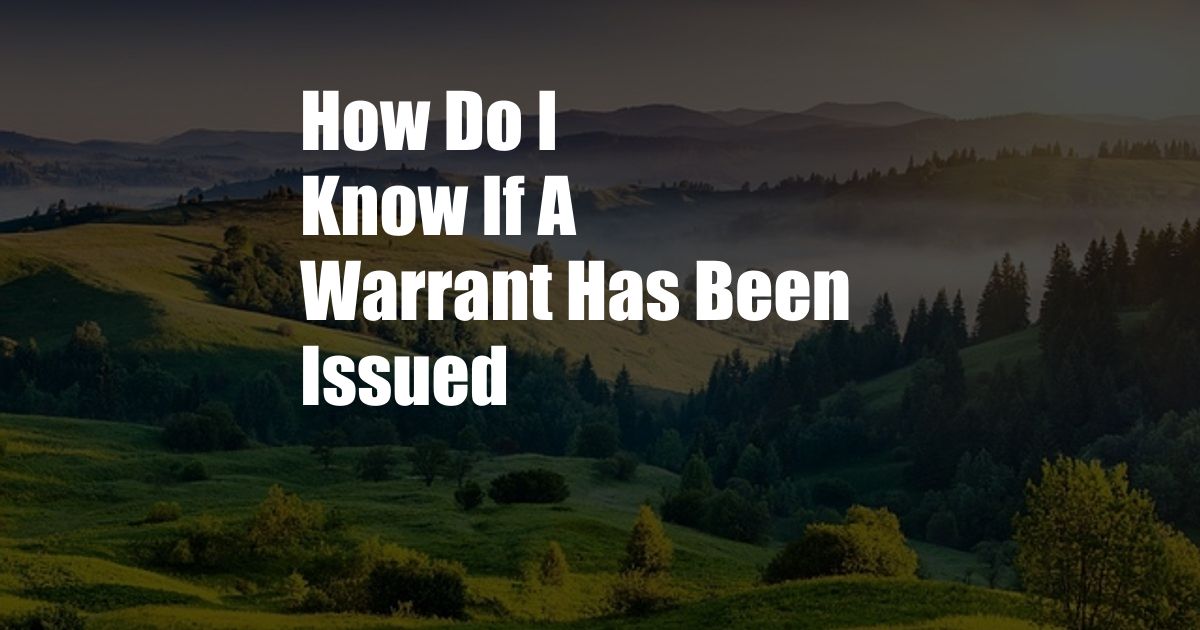
**How Do I Know If a Warrant Has Been Issued?**
Have you ever wondered if a warrant has been issued for your arrest? Perhaps you missed a court date or failed to pay a traffic ticket. You might be wondering if there is a way to find out if law enforcement is looking for you. The good news is that there are several ways to check if a warrant has been issued.
In this comprehensive guide, we will explore the various methods you can use to determine if a warrant has been issued in your name. We will discuss the legal implications of outstanding warrants and provide practical advice on what steps to take if you discover that a warrant has been issued for your arrest.
**Checking for Outstanding Warrants**
**1. Contact the Issuing Court**
The most direct way to check for outstanding warrants is to contact the court that issued the warrant. You can find the contact information for the court on the court’s website or by calling the county courthouse. Once you have contacted the court, provide the clerk with your name, date of birth, and any other identifying information they may require.
The clerk will search the court’s database for any outstanding warrants. If a warrant has been issued, the clerk will provide you with information about the charge(s) against you, the amount of bail, and the court date.
**2. Use a Warrant Search Website**
There are several websites that allow you to search for outstanding warrants. These websites typically charge a small fee for their services. However, they can be a convenient way to check for warrants if you do not want to contact the court directly.
When using a warrant search website, you will need to provide your name, date of birth, and social security number. The website will then search public records for any outstanding warrants. If a warrant has been issued, the website will provide you with information about the charge(s) against you and the court that issued the warrant.
**3. Contact Your Local Police Department**
You can also contact your local police department to check for outstanding warrants. The police department will have access to a database of outstanding warrants for the entire state. If a warrant has been issued for your arrest, the police department will be able to provide you with information about the charge(s) against you and the court that issued the warrant.
It is important to note that not all police departments will be able to provide you with information about outstanding warrants. Some police departments only have access to warrants that have been issued in their own jurisdiction. If the warrant was issued in a different jurisdiction, you may need to contact the police department in that jurisdiction.
**What to Do If You Discover a Warrant Has Been Issued**
If you discover that a warrant has been issued for your arrest, it is important to take action immediately. You should contact the court that issued the warrant and make arrangements to turn yourself in. Failing to turn yourself in could result in additional charges being filed against you.
When you turn yourself in, you will be taken to jail and booked. You will then be given a chance to appear before a judge. The judge will determine whether or not to release you on bail. If you are released on bail, you will be required to appear in court on the date specified in the warrant.
**Tips and Expert Advice**
Here are a few tips and expert advice on how to handle an outstanding warrant:
- Do not ignore a warrant. Ignoring a warrant will only make the situation worse.
- Contact the court or police department immediately if you discover a warrant has been issued for your arrest.
- Be polite and respectful when you contact the court or police department.
- Follow the instructions of the court or police department.
- If you cannot afford to hire an attorney, you may be eligible for a public defender.
By following these tips, you can help to resolve an outstanding warrant quickly and efficiently.
**Frequently Asked Questions**
Q: What happens if I am arrested on a warrant?
A: If you are arrested on a warrant, you will be taken to jail and booked. You will then be given a chance to appear before a judge. The judge will determine whether or not to release you on bail. If you are released on bail, you will be required to appear in court on the date specified in the warrant.
Q: What if I cannot afford to pay bail?
A: If you cannot afford to pay bail, you may be eligible for a public defender. A public defender is an attorney who is appointed by the court to represent indigent defendants. Public defenders are available in all states.
Q: What are the consequences of failing to appear in court on a warrant?
A: Failing to appear in court on a warrant is a crime. If you fail to appear in court, the judge may issue a bench warrant for your arrest. A bench warrant is a warrant that is issued by a judge for the purpose of bringing a defendant before the court.
**Conclusion**
If you are concerned that a warrant may have been issued for your arrest, it is important to take action immediately. By following the steps outlined in this guide, you can check for outstanding warrants and take the necessary steps to resolve the situation.
Please note that this article is for informational purposes only and should not be considered legal advice. If you have any questions about outstanding warrants, you should contact an attorney.
Are you interested in learning more about outstanding warrants? Browse our website for more information.